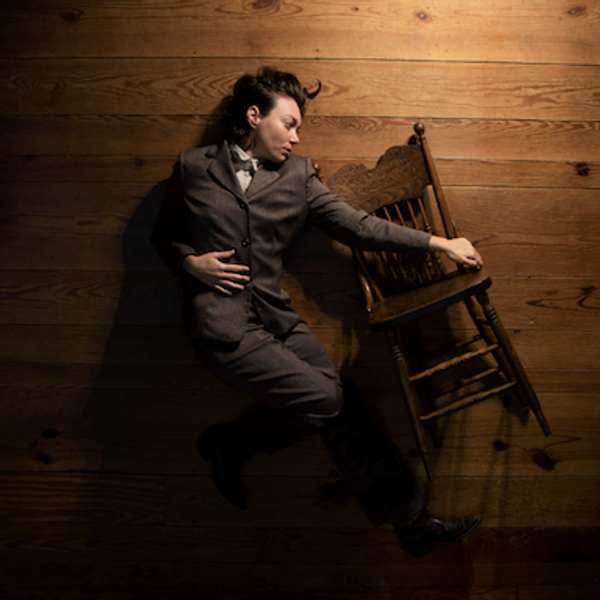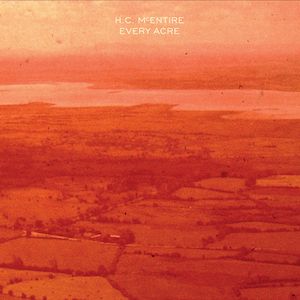




Link copied

When first listening to H.C. McEntire, it’s difficult not to ache a little, wishing you could have known her yesterday.
With songs that feel like a hand to hold, her music is gospel to the lost and the lonesome. With lyrics that light the way as a delicate understanding is exchanged between verses, her sound is classic and sturdy with a voice like the wind – first soft then stormy, everything surrendering to her gale force words.
Ahead of the release of her third solo album Every Acre, here’s 10 things to know about H.C. McEntire.
1. She was a touring member in Angel Olsen's band
McEntire was a part of Angel Olsen's touring band for two years, performing backup vocals and at times playing synthesizer and auxiliary percussion. This was during the album cycle for Olsen’s third studio release, My Woman, and it was an experience McEntire took a lot away from.
“I’m grateful for the opportunity to have experienced so many stages all over the world, and for the perspectives of being in a large band, not being the front person, and supporting someone else’s creative vision,” she explains to Holler. “Even though we were friends before we were collaborators, to sing with Angel every night was a total dream. I love how our voices work together; we developed this vocal synergy on stage that felt otherworldly.”
“Without a doubt, the experience ultimately made me a better singer with greater awareness of vocal possibility and power,” she continues. “It’s not just anyone’s voice—it’s Angel Olsen’s voice, you know? She’s one of the best vocalists of our generation, so I took it seriously and wanted to only enhance her experience of her songs.”
2. She's in a band called Mount Moriah
McEntire makes up one-third of the alt-Americana ensemble Mount Moriah, a side project that gives her a different perspective when approaching her solo efforts.
“I can move quicker in decision-making and planning,” she says of the benefits of her solo work, but adds, “Along with that freedom from negotiation comes the responsibility of being solely accountable for everything—from press to process to prosperity to finances.”
In her band and outside of it, she holds tight to the same values in every musical environment. “It’s really important to me to create as democratic of an ecosystem as possible for the collaborators involved in my solo work,” she says, adding the same sentiment in regards to her bandmates. “I want my bandmates to feel valued, and certain of my trust in them creatively.”
3. It was a bandmate who encouraged her to pursue her solo career
McEntire was encouraged to pursue her solo career by several people, but one Mount Moriah bandmate in particular was her biggest champion when it came to taking the leap.
She explained, Jenks Miller “saw our personal lives and career goals beginning to deviate; he wanted to start a family and disengage from touring but challenged me to see myself, my music career, extending past Mount Moriah.”
More motivation came from collaborator Kathleen Hanna - feminist activist and lead singer of Bikini Kill - who offered direction for her solo debut, LIONHEART.
4. She lives for a good collaboration
A frequent collaborator, McEntire takes something new away from each joint project.
“Collaboration is so incredibly intimate and surrendering to that vulnerability, to that change in process, that relinquishing of control, that joining of ideas, demands care and patience. But the alchemy that is possible and the output inspired by that commitment of selves can lead to extremely brave and boundary-breaking compositions.”
5. She has a genre-spanning love of music (particularly the Bee Gees and Neil Young)
The country music multi-hyphenate cannot exist on twang alone. McEntire has a diverse affinity for music.
A diehard fan of the Bee Gees, she loves their whole catalog. From the early folk songs to the dance floor-ready disco hits to the deliciously sappy ballads, she wants all of it.
If she could have written any song, she would have penned the Bonnie Raitt classic 'I Can’t Make You Love Me'. And she could listen to Neil Young’s Harvest on repeat and never tire of it.
6. She'll be going on tour with punk legends Bikini Kill this spring
McEntire will hit the road with legendary punks Bikini Kill in the spring of 2023.
“I cut my punk rock teeth on Bikini Kill. They taught me the power of standing up tall for something you believe in, especially in a room full of idle folks who fear anything beyond sitting still.”
Ravaging North America together, the combo will create a whole lot of country-punk magic.
7. Exercise, sleep and meditation are her on-the-road essentials
On tour, exercise is a must-have. “I like to go for a run in the mornings, stretch, do a bit of weight-lifting or push ups and sit ups.” Also, a restful sleep, a short meditation, and practicing a positive attitude are all on-the-road essentials. “If there’s time, I also like to pop into a thrift or vintage store before load in.”
8. A fresh perspective is her key to writing a great song
Songwriting is a balancing act, a push and pull between what you want to say and what works as a song. For McEntire, songwriting works best when given a fresh perspective.
“Take a universal emotion,” she details, “something that has been written about millions of times throughout the history of songwriting, be it heartbreak or love or sadness or work, and give it a fresh perspective that doesn’t feel redundant. Either via imagery, tone, instrumentation, dynamics, lyrics,” she continues. “Saying something that is meaningful to your life and relatable to others, but also challenges the shape of those basic emotional concepts or chord progressions.”
She adds, “To me, a song that leaves you really believing the storyteller or performer, whatever they are saying, is transportive and what I would consider a success.”
9. She knows exactly what advice she'd give her younger self
Knowing what she knows now, McEntire has some advice for her younger self starting out in music.
“I would impress upon her how much she deserved to be there, exploring and experimenting—sonically, personally, spiritually. To see being a self-taught musician as empowering, particularly as a woman, that there is a place for her to be in all this, and it won’t ever be easy—in fact, it’s going to be one of the hardest routes you could take in life—but to tell your truth on your terms and with integrity is possible, and healing.”
10. Her new album, Every Acre, is out on January 27
McEntire is set to release her third solo album, Every Acre, on January 27. The album is a 9-track exploration of loss, love and home.
“As an artist, if what I’m after is meaning and understanding, then vulnerability is how I find my edges. In my experience, if that pursuit is honest and unfiltered, on some level it will also be uncomfortable. Every Acre encouraged a slow observation of everything around me—great heights and vast depths, immeasurable static, and some fragments still coming into focus.”
---





